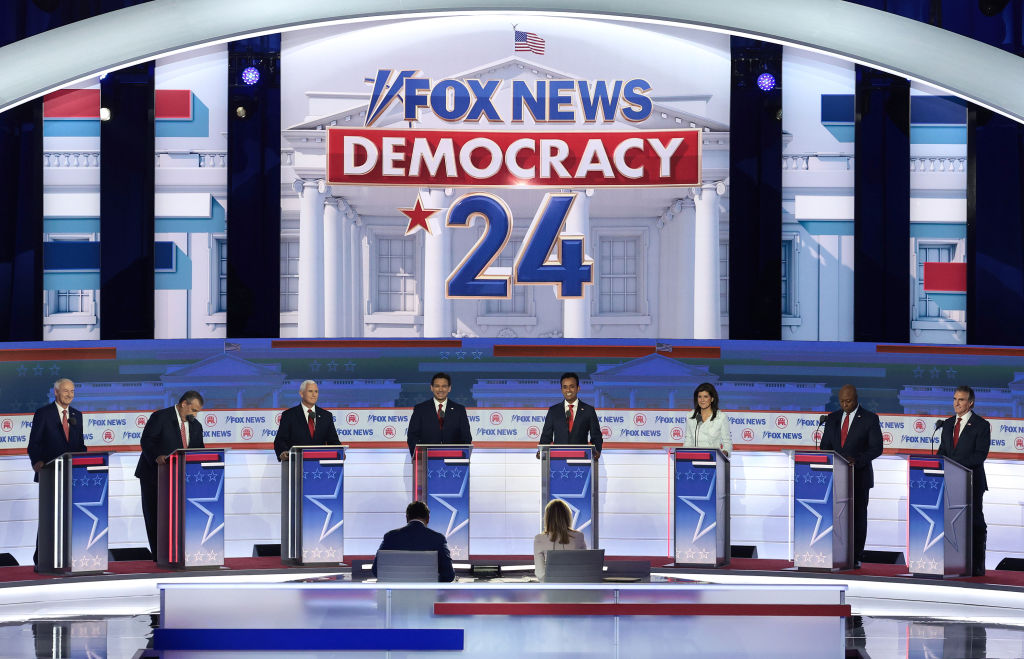MILWAUKEE—Confronted during last week’s debate with some of the most obvious questions about Donald Trump they could have faced, most Republicans challenging the former president for the 2024 nomination managed to fumble the ball—despite having months to prepare.
Did former Vice President Mike Pence do the right thing on January 6 when he refused Trump’s demands to block certification of President Joe Biden’s 2020 election victory? When pressed by Fox News moderators Bret Baier and Martha MacCallum, some candidates responded only cryptically; others refused to answer entirely.
When the candidates were instructed to raise their hand if they planned to support Trump as the GOP nominee even if he is found guilty “in a court of law,” Florida Gov. Ron DeSantis, who was center-stage, looked first to his left, then right, before sheepishly lifting his arm halfway. He was followed by Pence, who, like the Florida governor, only jumped in after seeing Vivek Ramaswamy, Nikki Haley, Tim Scott, and Doug Burgum with their hands in the air.
Sen. John Thune, in Milwaukee to lend a hand to the Scott campaign, said the candidates are “all trying to grapple” with the fact that Trump’s prospects in the GOP primary seems to improve every time he is indicted on one alleged misdeed or another. But the South Dakota Republican conceded that, if they have any chance of taking the frontrunner down, they are going to have to do a better job of addressing Trump’s legal woes in the future.
“These candidates will have to, probably, come up with more fulsome answers to that question,” Thune said during a brief interview Wednesday evening in the spin room, adjacent to the debate hall. “The truth is, we all have to be held accountable. The question is: Were there laws broken? And if there were, is justice going to be served?”
DeSantis distinguished himself yet again during the two-hour, prime-time debate by dodging the aforementioned question about Pence and January 6, talking instead about what he sees as the “weaponization” of federal agencies while complaining that MacCallum’s question was focused on the past rather than the future. Only after the moderators pointed out he hadn’t answered the question—and Pence interjected to argue voters “deserved to know” candidates’ stance—did the governor relent. Kind of.
“We’ve answered this so many times! I’ve answered this before. Why are we—Mike did his duty; I’ve got no beef with him,” DeSantis said. “But here’s the thing: Is this what we’re going to be focusing on going forward, the rehashing of this? I’ll tell you, the Democrats would love that.”
Post-debate, senior DeSantis advisers dismissed suggestions that the hemming and hawing related to Trump came off as weak—and the initial wave of post-debate snap polls and focus groups seemed to back them up. “It was a great night for us,” said Ryan Tyson, the governor’s pollster. “I think he was very clear what his answer is. … He’s ready to move on, past this stuff.”
Ramaswamy, who undoubtedly had one of the standout performances of the debate, wasn’t asked the question about Pence’s handling of January 6 on stage. But John McCormack of National Review pressed him on the topic in the post-debate spin room. “I would have done it very differently,” Ramaswamy said. How so? It’s unclear. His answer was convoluted, neither supporting Trump’s position that the election should have been overturned, nor offering a comprehensible alternative to Pence’s action.
“So I think that there was a historic opportunity that was missed to settle a score in this country to say that we’re actually going to have a national compromise on this—single-day voting on Election Day as a federal holiday, which I think Congress should have acted in that window between November and January to say: paper ballots, government-issued ID. And if that’s the case, then we’re not going to complain about stolen elections. And if I were there, I would have declared on January 7th, saying now I’m going to win in a free and fair election.”
No candidate in Milwaukee last week should have been surprised that they were asked these questions. That the answers were still so garbled is a testament to Trump’s continued dominance in the Republican Party, both in the presidential primary polls and his ability to force other candidates into difficult situations. If a candidate confronts or questions Trump, they risk alienating a significant chunk of GOP primary voters. If they stand by him, they’ll lose a separate, smaller chunk of GOP primary voters—and damage their general election prospects as well.
That said, the fence-sitting we saw on stage is unlikely to work, either. Voters in the Trump era value boldness and authenticity. The former president’s ability to make his GOP rivals look like equivocating politicians is another reason why he remains the leader of the pack—and is more likely than not to stay on top. None of this is lost on the Trump campaign, which is using their candidate’s myriad controversies to box in those who seek to supplant him atop the party.
“It’s like a panicked deer in the headlights,” Donald Trump Jr. told reporters in Milwaukee after the debate, wasting little time using the candidates’ hesitation to address questions about the frontrunner against them. Trump’s eldest son was referring to DeSantis, but he might as well have been speaking about most of his father’s rivals.







Please note that we at The Dispatch hold ourselves, our work, and our commenters to a higher standard than other places on the internet. We welcome comments that foster genuine debate or discussion—including comments critical of us or our work—but responses that include ad hominem attacks on fellow Dispatch members or are intended to stoke fear and anger may be moderated.
With your membership, you only have the ability to comment on The Morning Dispatch articles. Consider upgrading to join the conversation everywhere.